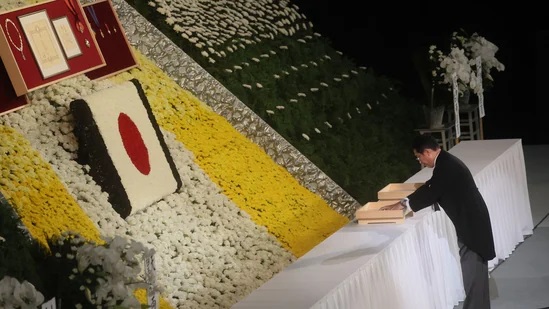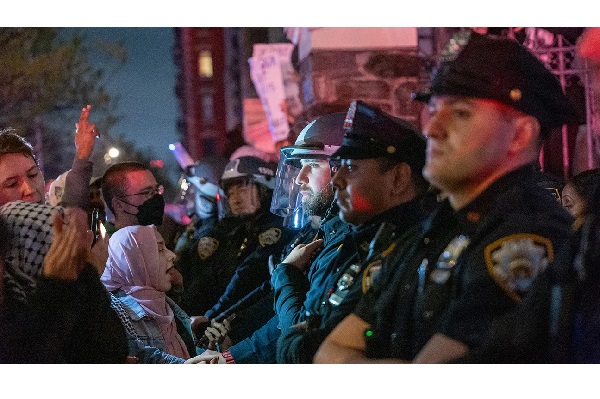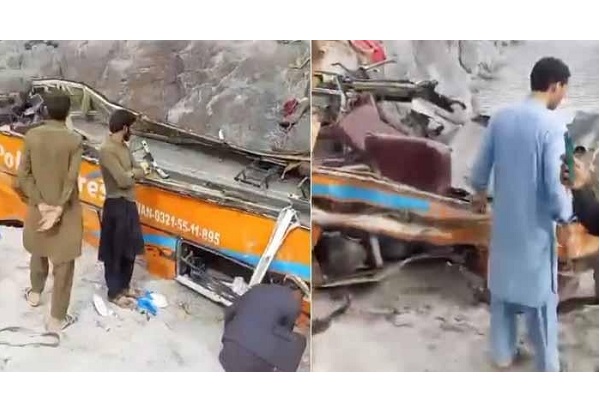LOS ANGELS: Police forcibly removed scores of defiant pro-Palestinian protesters at several colleges on Thursday, including taking
TOKYO: Japan honoured former Prime Minister Shinzo Abe on Tuesday at the first state funeral for a former premier in 55 years — a ceremony that has become as divisive as he was in life.
Abe’s ashes, carried by his widow Akie, arrived at the storied Budokan venue in Tokyo, where a 19-gun salute sounded in honour of the slain former leader.
The motorcade carrying his remains had travelled from his widow’s home in the capital, past a row of white-uniformed armed troops who stood to attention.
Outside the Budokan, thousands of Japanese people stood in line as the ashes arrived, waiting to deliver flowers and say a prayer in two mourning tents.
Toru Sato, 71, leaned on his cane as he waited. “I only know Abe-san on TV. He worked so hard. His death was so tragic. I felt so sorry for him,” he told AFP.
Japan’s Crown Prince Akishino (2nd L) and other members of the royal family attend the state funeral for Japan’s former prime minister Shinzo Abe in the Nippon Budokan in Tokyo on Tuesday.
“I know it’s divisive and there are a lot of people against this, but there were so many people lined up to offer flowers,” said Yoshiko Kojima, a 63-year-old Tokyo housewife.
“I felt that now the funeral is actually taking place, many people have come out to pray for him.”
Koji Takamori came all the way from northern Hokkaido with his nine-year-old son. “I wanted to thank him. He has done so much for Japan,” the 46-year-old said.
“The way he died was so shocking. To be honest, I also came because there has been so much opposition. It’s almost like I’m here to oppose those who are opposing this (funeral),” he added.
Those opponents were also out, albeit in much smaller numbers, marching near the tents before an expected demonstration in front of the parliament.
Abe was Japan’s longest-serving prime minister and one of the country’s most recognisable political figures, known for cultivating international alliances and his “Abenomics” economic strategy.
He resigned in 2020 over recurring health problems, but remained a key political voice and was campaigning for his ruling party when a lone gunman killed him on July 8.
The shooting sent shock waves through a country with famously low gun crime and prompted international condemnation.
Indian Prime Minister Narendra Modi arrives at the Budokan hall to attend the state funeral of slain former Japanese Prime Minister Shinzo Abe who was shot dead during an election campaign in Tokyo on Tuesday. — Reuters
But the decision to give him a state funeral — only the second for a former premier in the post-war period — has provoked opposition, with around 60 percent of Japanese against the event in recent polls.
Abe’s accused killer targeted the former leader believing he had ties to the Unification Church, which he resented over massive donations his mother had made to the sect.
The assassination prompted fresh scrutiny of the church and its fundraising, and uncomfortable questions for Japan’s political establishment, with the ruling party admitting around half its lawmakers had links to the religious organisation.
Prime Minister Fumio Kishida has pledged the party will sever all ties with the church, but the scandal helped fuel discontent over the state funeral.
Even without the recent revelations about the Unification Church, it would be hard to imagine any circumstances where a majority of Japanese would favour honouring Abe with a state funeral, said Tobias Harris, a senior fellow at the Centre for American Progress and the author of a biography of the former premier.
“He was someone who almost welcomed and invited controversy and saw his mission as overturning a longstanding consensus or set of consensuses” about how Japan was run, Harris said.
Many Japanese were “attached to the postwar regime that he wanted to overturn”, Harris said.
Thousands have protested the ceremony and a man set himself on fire last week near the prime minister’s office, leaving notes reportedly expressing his objection to the event.
United States Vice President, Kamala Harris, arrives during the state funeral for Japan’s former prime minister Shinzo Abe on Tuesday at the Budokan in Tokyo, Japan. — Reuters
Some lawmakers from opposition parties are also boycotting the funeral. The controversy has various causes, with some accusing Kishida of unilaterally approving the funeral instead of consulting parliament, and others resentful of a nearly $12 million price tag.
It is also the legacy of Abe’s divisive tenure, marked by persistent allegations of cronyism, and opposition to his nationalism and plans to reform the pacifist constitution.
Kishida’s government may be hoping the solemnity of the event, attended by an estimated 4,300 people including 700 foreign invitees, will drown out the controversy.
US Vice President Kamala Harris and world leaders including Indian Prime Minister Narendra Modi and Australian premier Anthony Albanese were among those in attendance.
Abe worked to cultivate close ties with Washington to bolster the key US-Japanese alliance, and also courted a stronger “Quad” grouping Japan, the United States, India and Australia.
The mourners will hear eulogies from Kishida and politicians including Yoshihide Suga, who succeeded Abe after his resignation.
You May Also Like
WASHINGTON: The US State Department said on Thursday that Washington supports Pakistan’s efforts to stabilise its economy,
KARAKORAM: At least 20 people died while 21 others were injured on Friday morning when a passenger bus overturned on the






